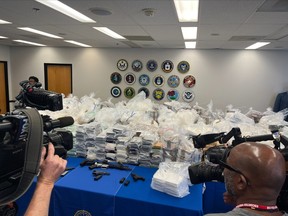While under investigation, Roberto Scoppa told an undercover agent that he earned $1 million a year bringing cocaine into Canada.

Article content
Lawyers representing Roberto Scoppa, brother of two deceased Montreal mafia members, have been asked to present more evidence of how a GPS tracking device would work if their client is to be released while fighting an extradition request from the US, where it faces. drug trafficking charges.
On Tuesday, during a bail hearing in Montreal court, Superior Court Judge Marc-André Blanchard asked Jeffrey Boro and another lawyer representing Scoppa if they could have a representative of a company that makes the device testify on Thursday about how it works.
Advertisement 2
Article content
Article content
While making the case for Scoppa’s release, Boro offered the bracelet as a solution for authorities to monitor his client if Blanchard ultimately grants him bail.
Erin Morgan, the lawyer representing Canada’s Justice Minister in the extradition request, opposed Scoppa’s release and said she wanted more information about the ankle bracelet. She noted that there have been well-documented cases where people have been able to remove the bracelets with ease.
Blanchard agreed to resume the hearing Thursday.
Scoppa, 55, is the brother of Andrea (Andrew) and Salvatore Scoppa, two influential Montreal mafia leaders who were murdered on different dates in 2019. According to evidence heard in recent murder trials held in Montreal, both brothers were the protagonists of a conflict between Calabrian and Sicilian clans within the Montreal mafia. An informant who testified in those murder trials alleged that both Andrea and Salvatore ordered the deaths of several important people in the Rizzuto organization during 2016.
On Tuesday, Boro argued that while Roberto Scoppa’s brothers may have been part of the Montreal mafia, that doesn’t mean his client is too.
Article content
Advertisement 3
Article content
Morgan added that the US government’s request to deny bail is not based on an allegation that Scoppa is part of the Montreal mafia.
Scoppa was arrested in late January as part of Operation Dead Hand.
According to a press release issued in January by the U.S. Attorney’s Office for the Central District of California, 19 people in total have been charged in the United States “for their alleged roles in the organized crime syndicate, including Mexico-based suppliers who brought in large quantities of narcotics to the United States, American distributors, a Canadian who ran an export organization, Canadian-based truck drivers operating in the United States, and a large-scale Canadian trafficker and Italian organized crime figure, Robert Scoppa, who investigators allege was purchasing massive quantities of drugs in bulk.”
US authorities allege that the group used “handlers (who) coordinated the collection and delivery of large shipments of cocaine and methamphetamine, which were loaded into long-haul semi-trailers bound for Canada.
“Transportation was coordinated by a network of drivers working with dozens of trucking companies that made numerous border crossings from the United States to Canada via the Detroit Windsor Tunnel, the Buffalo Peace Bridge and the Blue Water Bridge.”
Advertisement 4
Article content
While presenting his arguments against Scoppa’s release, Morgan noted how, when Operation Dead Hand was underway, Scoppa had dinner with a person who was working as an undercover agent on the investigation.
(After some drugs were seized) “Scoppa told the confidential witness that they needed to make sure this didn’t happen again,” Morgan said. “(Scoppa also said) that they should make smaller loads of just 100 kilograms (of cocaine) a month to go undetected and that Scoppa makes $1 million a year using that method. This is an indication that he is someone of authority or some planning, who does it regularly.
“They also discussed money laundering through cryptocurrencies.”
Morgan also said there is evidence that, during the investigation, Scoppa stayed at the same hotel in Colombia as Martin Robert, one of the most influential members of the Hells Angels in Quebec. Scoppa testified during his bail hearing and admitted that he stayed at the hotel at the same time as Hells Angel, but denied meeting Robert.
Advertisement 5
Article content
Article content
